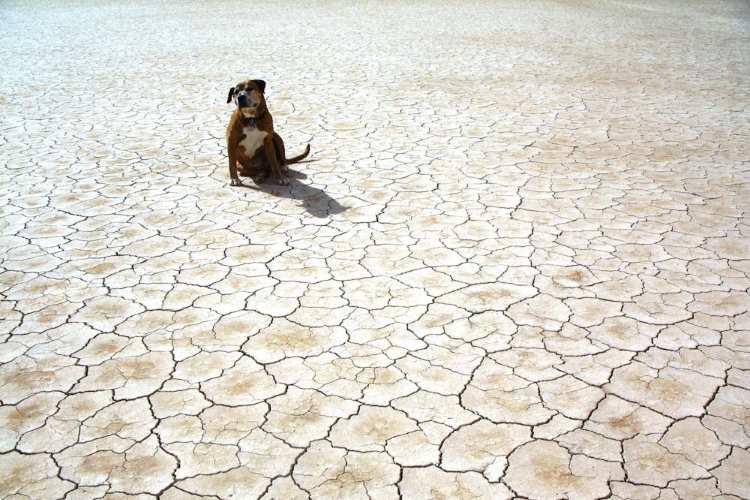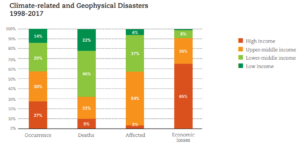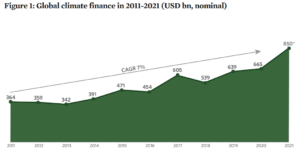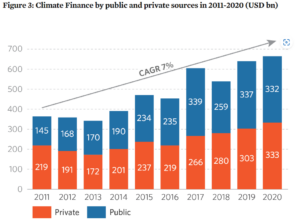
Climate change has profound implications for economies worldwide, especially for India. The world’s fifth largest economy stands on the precipice of severe economic disruptions because of its vulnerability to extreme climate events. The 21st century saw a series of climate catastrophes in India, from floods and landslides to unprecedented heatwaves. The impact has been both human and economic, with more than a billion Indians affected and financial losses exceeding $120 billion since the turn of the century, says a newspaper report, citing climate disaster database EMDAT.
While the economic toll of climate change is heavy, the non-economic impacts are equally devastating and merit serious consideration. Loss of life and biodiversity has resulted in loss of ecological resilience and capacity for environmental recovery. Heatwaves and erratic monsoon patterns not only disrupt ecosystems, but also affect the daily lives of millions of Indians, leading to health crises and limiting access to natural resources. These non-economic damages underline the human side of climate statistics and emphasise the urgent need for environmental stewardship.
In 2015, a peak year, 347 million Indians were struck by natural disasters, highlighting the growing intensity and frequency of such events. The data from the National Crime Records Bureau (NCRB) also paints a grim picture, indicating a rising death toll due to natural forces with more than 8,000 fatalities in 2022 alone.

READ | Funding fairness: Closing the climate finance gap for inclusive future
Economic implications of climate change
A recent study published in the Nature journal, undertaken by the Potsdam Institute for Climate Impacts Research, projects dire economic consequences by 2050. It estimates a 22% fall in India’s national income due to climate change — three percent points higher than the global average. This projection highlights a significant fall in agricultural yields, diminished labour productivity, and escalating infrastructure challenges due to altered rainfall patterns and rising temperatures.
Looking beyond 2050, the global economy could suffer losses up to 60% by 2100 if current trends persist. This prognosis necessitates a concerted global effort towards drastic emission reductions and robust adaptation strategies. India, as a rapidly developing nation and a significant emitter of greenhouse gases, finds itself at a critical juncture to pivot towards sustainable practices that could mitigate these economic devastations.
The urgency for adaptation and resilience
The relentless rise in temperatures, particularly pronounced in heatwaves between April and June, resulted in more than 100 deaths last year. The World Meteorological Organisation says India is warming at a pace faster than the global average, intensifying the frequency and severity of climate-related disasters. The climate anomalies observed in 2023, including record-high temperatures and disrupted oceanic conditions, have reaffirmed the need for adaptive strategies.


India must prioritise building resilience against climate impacts through infrastructural adjustments and policy reforms. This includes advancing renewable energy projects, enhancing water conservation techniques, and bolstering coastal and urban resilience against extreme weather events.
Another critical aspect of climate impact is the displacement of populations. As sea levels rise and weather patterns become more unpredictable, many communities, especially in coastal and flood-prone regions, face the threat of displacement. This not only causes immediate humanitarian crises but also long-term socio-economic challenges as displaced populations seek new livelihoods and strain the resources of host communities. Addressing the needs of these vulnerable groups through inclusive policies and support systems is essential for maintaining social stability and ensuring equitable development.
Investing in the future
The global nature of climate change demands a coordinated international response. India, while taking robust steps domestically, must also engage in and sometimes lead multinational efforts to combat climate change. This involves adhering to international agreements, such as the Paris Agreement, and actively participating in global forums. Moreover, fostering cooperation with neighbouring countries to manage shared resources and environmental challenges is crucial. International collaboration can lead to shared technology transfers, financial resources, and strategic partnerships, all of which are vital for a comprehensive global response to climate change.
Amid these challenges, there is a silver lining. The transition to a low-carbon economy opens avenues for job creation and economic growth in sectors like renewable energy, energy efficiency, and sustainable infrastructure. Initiatives are needed to equip the future workforce with necessary green skills, with India poised to create millions of new jobs in the climate and energy sectors by 2070.
The evidence is irrefutable — climate change is an imminent threat with catastrophic economic implications for India. To effectively tackle the challenges posed by climate change, the country needs to strengthen its policy and regulatory frameworks. This includes enacting stricter emissions regulations, promoting green building standards, and ensuring that urban planning is resilient to climate impacts. Legislative measures must also encourage the adoption of sustainable practices across all sectors of the economy. By creating an enabling environment for green investments and innovations, these policies can pave the way for a sustainable economic future and a resilient society.
